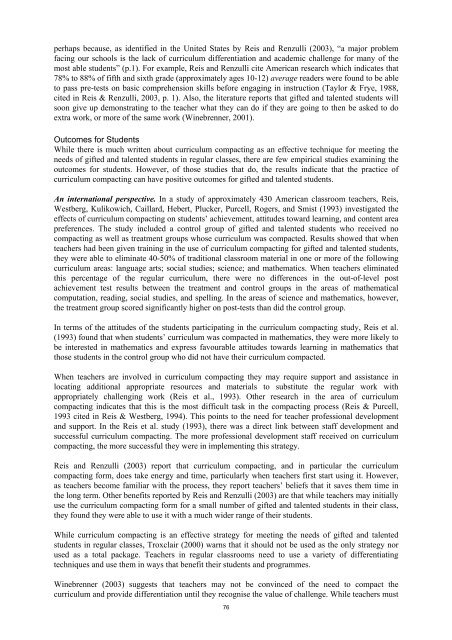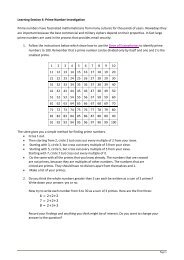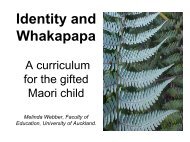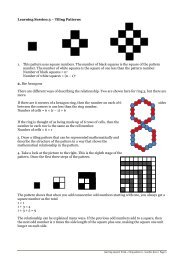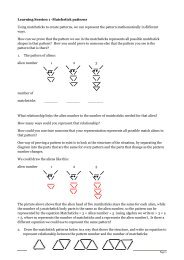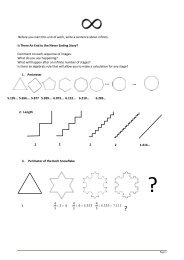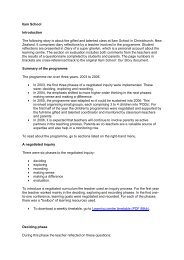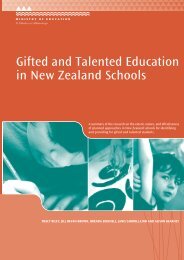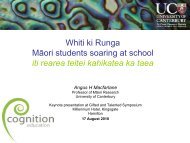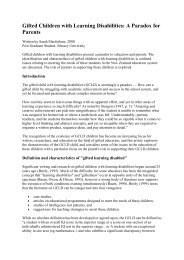The Extent, Nature and Effectiveness of Planned Approaches in ...
The Extent, Nature and Effectiveness of Planned Approaches in ...
The Extent, Nature and Effectiveness of Planned Approaches in ...
You also want an ePaper? Increase the reach of your titles
YUMPU automatically turns print PDFs into web optimized ePapers that Google loves.
perhaps because, as identified <strong>in</strong> the United States by Reis <strong>and</strong> Renzulli (2003), “a major problemfac<strong>in</strong>g our schools is the lack <strong>of</strong> curriculum differentiation <strong>and</strong> academic challenge for many <strong>of</strong> themost able students” (p.1). For example, Reis <strong>and</strong> Renzulli cite American research which <strong>in</strong>dicates that78% to 88% <strong>of</strong> fifth <strong>and</strong> sixth grade (approximately ages 10-12) average readers were found to be ableto pass pre-tests on basic comprehension skills before engag<strong>in</strong>g <strong>in</strong> <strong>in</strong>struction (Taylor & Frye, 1988,cited <strong>in</strong> Reis & Renzulli, 2003, p. 1). Also, the literature reports that gifted <strong>and</strong> talented students willsoon give up demonstrat<strong>in</strong>g to the teacher what they can do if they are go<strong>in</strong>g to then be asked to doextra work, or more <strong>of</strong> the same work (W<strong>in</strong>ebrenner, 2001).Outcomes for StudentsWhile there is much written about curriculum compact<strong>in</strong>g as an effective technique for meet<strong>in</strong>g theneeds <strong>of</strong> gifted <strong>and</strong> talented students <strong>in</strong> regular classes, there are few empirical studies exam<strong>in</strong><strong>in</strong>g theoutcomes for students. However, <strong>of</strong> those studies that do, the results <strong>in</strong>dicate that the practice <strong>of</strong>curriculum compact<strong>in</strong>g can have positive outcomes for gifted <strong>and</strong> talented students.An <strong>in</strong>ternational perspective. In a study <strong>of</strong> approximately 430 American classroom teachers, Reis,Westberg, Kulikowich, Caillard, Hebert, Plucker, Purcell, Rogers, <strong>and</strong> Smist (1993) <strong>in</strong>vestigated theeffects <strong>of</strong> curriculum compact<strong>in</strong>g on students’ achievement, attitudes toward learn<strong>in</strong>g, <strong>and</strong> content areapreferences. <strong>The</strong> study <strong>in</strong>cluded a control group <strong>of</strong> gifted <strong>and</strong> talented students who received nocompact<strong>in</strong>g as well as treatment groups whose curriculum was compacted. Results showed that whenteachers had been given tra<strong>in</strong><strong>in</strong>g <strong>in</strong> the use <strong>of</strong> curriculum compact<strong>in</strong>g for gifted <strong>and</strong> talented students,they were able to elim<strong>in</strong>ate 40-50% <strong>of</strong> traditional classroom material <strong>in</strong> one or more <strong>of</strong> the follow<strong>in</strong>gcurriculum areas: language arts; social studies; science; <strong>and</strong> mathematics. When teachers elim<strong>in</strong>atedthis percentage <strong>of</strong> the regular curriculum, there were no differences <strong>in</strong> the out-<strong>of</strong>-level postachievement test results between the treatment <strong>and</strong> control groups <strong>in</strong> the areas <strong>of</strong> mathematicalcomputation, read<strong>in</strong>g, social studies, <strong>and</strong> spell<strong>in</strong>g. In the areas <strong>of</strong> science <strong>and</strong> mathematics, however,the treatment group scored significantly higher on post-tests than did the control group.In terms <strong>of</strong> the attitudes <strong>of</strong> the students participat<strong>in</strong>g <strong>in</strong> the curriculum compact<strong>in</strong>g study, Reis et al.(1993) found that when students’ curriculum was compacted <strong>in</strong> mathematics, they were more likely tobe <strong>in</strong>terested <strong>in</strong> mathematics <strong>and</strong> express favourable attitudes towards learn<strong>in</strong>g <strong>in</strong> mathematics thatthose students <strong>in</strong> the control group who did not have their curriculum compacted.When teachers are <strong>in</strong>volved <strong>in</strong> curriculum compact<strong>in</strong>g they may require support <strong>and</strong> assistance <strong>in</strong>locat<strong>in</strong>g additional appropriate resources <strong>and</strong> materials to substitute the regular work withappropriately challeng<strong>in</strong>g work (Reis et al., 1993). Other research <strong>in</strong> the area <strong>of</strong> curriculumcompact<strong>in</strong>g <strong>in</strong>dicates that this is the most difficult task <strong>in</strong> the compact<strong>in</strong>g process (Reis & Purcell,1993 cited <strong>in</strong> Reis & Westberg, 1994). This po<strong>in</strong>ts to the need for teacher pr<strong>of</strong>essional development<strong>and</strong> support. In the Reis et al. study (1993), there was a direct l<strong>in</strong>k between staff development <strong>and</strong>successful curriculum compact<strong>in</strong>g. <strong>The</strong> more pr<strong>of</strong>essional development staff received on curriculumcompact<strong>in</strong>g, the more successful they were <strong>in</strong> implement<strong>in</strong>g this strategy.Reis <strong>and</strong> Renzulli (2003) report that curriculum compact<strong>in</strong>g, <strong>and</strong> <strong>in</strong> particular the curriculumcompact<strong>in</strong>g form, does take energy <strong>and</strong> time, particularly when teachers first start us<strong>in</strong>g it. However,as teachers become familiar with the process, they report teachers’ beliefs that it saves them time <strong>in</strong>the long term. Other benefits reported by Reis <strong>and</strong> Renzulli (2003) are that while teachers may <strong>in</strong>itiallyuse the curriculum compact<strong>in</strong>g form for a small number <strong>of</strong> gifted <strong>and</strong> talented students <strong>in</strong> their class,they found they were able to use it with a much wider range <strong>of</strong> their students.While curriculum compact<strong>in</strong>g is an effective strategy for meet<strong>in</strong>g the needs <strong>of</strong> gifted <strong>and</strong> talentedstudents <strong>in</strong> regular classes, Troxclair (2000) warns that it should not be used as the only strategy norused as a total package. Teachers <strong>in</strong> regular classrooms need to use a variety <strong>of</strong> differentiat<strong>in</strong>gtechniques <strong>and</strong> use them <strong>in</strong> ways that benefit their students <strong>and</strong> programmes.W<strong>in</strong>ebrenner (2003) suggests that teachers may not be conv<strong>in</strong>ced <strong>of</strong> the need to compact thecurriculum <strong>and</strong> provide differentiation until they recognise the value <strong>of</strong> challenge. While teachers must76


